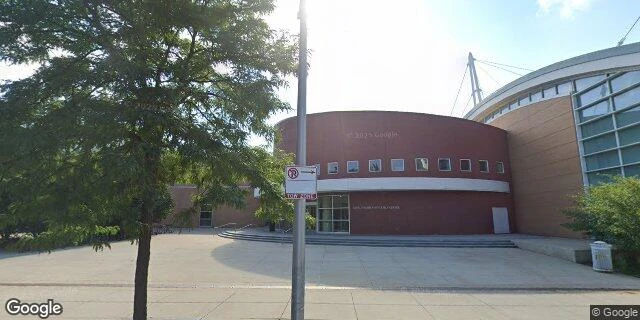Ratner Athletics Center
Chicago Building ID: 252037

Attribution: © Google 2026
Building Info
- Square Footage
- 168,984 sqft#3 Largest of Fitness Center/Health Club/GymsHigher than 62% of all buildings1.4x median124,364 sqft1.4x median Fitness Center/Health Club/Gym124,500 sqft
- Built
- 2003
- Primary Property Type
- Fitness Center/Health Club/Gym
- Community Area
- Hyde Park
- Ward
- 5
-
Chicago Energy Rating
- 2.0 / 4
- Owner

Note: Owner manually tagged. Logo used under fair use.
2023 Report Card
Debug Full Grade Data
- AvgPercentileLetterGrade: C
- AvgPercentileGrade: 42.52331684032725
- GHGIntensityLetterGrade: F
- GHGIntensityPercentileGrade: 3.499222395023324
- EnergyMixLetterGrade: B
- EnergyMixWeightedPctSum: 51.23118608862769
- EnergyMixPercentileGrade: 76.93426410703897
- SubmittedRecordsLetterGrade: A
- MissingRecordsCount: 0.0
- SubmittedRecordsPercentileGrade: 100.0
Emissions & Energy Information for 2023
- Greenhouse Gas Intensity F
- 16.8 kg CO2e / sqft#3 Highest of Fitness Center/Health Club/Gyms 🚨Higher than 97% of all buildings2.7x median6.2 kg CO2e / sqft1.2x median Fitness Center/Health Club/Gym13.9 kg CO2e / sqft
- Total Greenhouse Gas Emissions
- 2,835 tons CO2e#3 Highest of Fitness Center/Health Club/Gyms 🚨Higher than 86% of all buildings3.4x median841.4 tons CO2e2.1x median Fitness Center/Health Club/Gym1,358.1 tons CO2e
Years Reported
9/9
A

2015
2016
2017
2018
2019
2020
2021
2022
2023
Energy Breakdown for Ratner Athletics Center
- Fossil Gas Use (aka Natural Gas)
- Not Reported
This data was not reported for this building this year, which likely means a value of zero for this field.
This Building Uses District Heating ❗Although this building didn't burn any fossil gas on site, it's connected to a district heating system, a centralized system for heating multiple buildings. District heating systems can be fully electric, but in Chicago most district heating systems are fossil gas powered, meaning this building was most likely still heated with fossil gas.
- Electricity Use
- 10,261,728 kBtuEst. Electric Bill: $430,000 for 2023**Higher than 80% of all buildings2.9x median3,580,332.6 kBtu1.8x median Fitness Center/Health Club/Gym5,832,568.9 kBtu
- District Steam Use
- 15,937,010 kBtu2.5x median6,360,617.1 kBtu
- District Chilled Water Use
- 6,479,952 kBtu0.8x median7,765,434.2 kBtu
Energy Mix B
Total Energy Use: 32,678,691 kBTU
Scan To Learn More
https://electrifychicago.net/building/252037
View Extra Technical & Historic Info
- Source Energy Usage Intensity
- Not Reported
This data was not reported for this building this year, which likely means a value of zero for this field.
- Site Energy Usage Intensity
- Not Reported
This data was not reported for this building this year, which likely means a value of zero for this field.
Full Historical Data Table for Ratner Athletics Center
| Year |
Overall Grade |
Emissions Intensity Sub-Grade |
Energy Mix Sub-Grade |
Reporting Mix Sub-Grade | GHG Intensity kg CO2e / sqft | GHG Emissions metric tons CO2e | Energy Mix | Electricity Use kBTU |
District Steam Use kBTU |
District Chilled Water Use kBTU | Source EUI kBTU / sqft | Floor Area sqft |
Chicago Energy Rating |
|---|---|---|---|---|---|---|---|---|---|---|---|---|---|
| 2015 | D | F | C | A | 26.1 | 4,403 | 27%Electricity 0%Fossil Gas 54%Other | 11,915,963 | 23,793,673 | 8,132,400 | 438.9 | 168,984 | - |
| 2016 | D | F | B | A | 23.2 | 3,916 | 27%Electricity 0%Fossil Gas 50%Other | 10,994,280 | 20,822,453 | 9,626,400 | 409.5 | 168,984 | - |
| 2017 | D | F | B | A | 21.8 | 3,688 | 27%Electricity 0%Fossil Gas 54%Other | 10,280,881 | 21,051,414 | 7,389,600 | 384.6 | 168,984 | - |
| 2018 | C | F | B | A | 23.4 | 3,955 | 27%Electricity 0%Fossil Gas 54%Other | 11,805,117 | 23,380,192 | 8,335,200 | 406.9 | 168,984 | 1.0 |
| 2019 | C | F | B | A | 25.1 | 4,248 | 29%Electricity 0%Fossil Gas 50%Other | 13,891,160 | 23,485,813 | 9,880,200 | 450.6 | 168,984 | 1.0 |
| 2020 | D | F | B | A | 18.4 | 3,108 | 30%Electricity 0%Fossil Gas 57%Other | 10,232,984 | 19,428,075 | 4,205,688 | 330.5 | 168,984 | 2.0 |
| 2021 | C | F | B | A | 18.2 | 3,083 | 32%Electricity 0%Fossil Gas 56%Other | 10,960,531 | 19,336,257 | 4,441,572 | 343.2 | 168,984 | 2.0 |
| 2022 | C | F | B | A | 18.9 | 3,185 | 28%Electricity 0%Fossil Gas 54%Other | 10,782,878 | 20,936,408 | 7,118,316 | 366.1 | 168,984 | 1.0 |
| 2023 | C | F | B | A | 16.8 | 2,835 | 31%Electricity 0%Fossil Gas 49%Other | 10,261,729 | 15,937,010 | 6,479,952 | 318.4 | 168,984 | 2.0 |
* Note on Rankings: Rankings and medians are among included buildings, which are those who reported under the Chicago Energy Benchmarking Ordinance for the year 2023, which only applies to buildings over 50,000 square feet.
** Note on Bill Estimates:
Estimates for gas and electric bills are based on average electric and
gas retail prices for Chicago in 2021 and
are rounded. We expect large buildings would negotiate lower rates with
utilities, but these estimates serve as an upper bound of cost and help
understand the volume of energy a building is used by comparing it to
your own energy bills! See our
Chicago Gas & Electric Costs Source
for the original statistics.
Data Source:
Chicago Energy Benchmarking Data